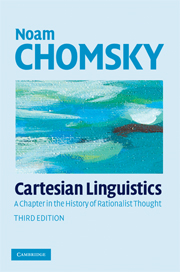Summary
Published online by Cambridge University Press: 25 January 2011
Summary
Returning to the remark of Whitehead's that initiated this discussion, it seems that after a long interruption, linguistics and cognitive psychology are now turning their attention to approaches to the study of language structure and mental processes which in part originated and in part were revitalized in the “century of genius” and which were fruitfully developed until well into the nineteenth century. The creative aspect of language use is once again a central concern of linguistics, and the theories of universal grammar that were outlined in the seventeenth and eighteenth centuries have been revived and elaborated in the theory of transformational generative grammar. With this renewal of the study of universal formal conditions on the system of linguistic rules, it becomes possible to take up once again the search for deeper explanations for the phenomena found in particular languages and observed in actual performance. Contemporary work has finally begun to face some simple facts about language that have been long neglected, for example, the fact that the speaker of a language knows a great deal that he has not learned and that his normal linguistic behavior cannot possibly be accounted for in terms of “stimulus control,” “conditioning,” “generalization and analogy,” “patterns” and “habit structures,” or “dispositions to respond,” in any reasonably clear sense of these much abused terms. As a result, a fresh look has been taken, not only at language structure, but at the preconditions for language acquisition and at the perceptual function of abstract systems of internalized rules.
Information
- Type
- Chapter
- Information
- Cartesian LinguisticsA Chapter in the History of Rationalist Thought, pp. 107 - 108Publisher: Cambridge University PressPrint publication year: 2009
